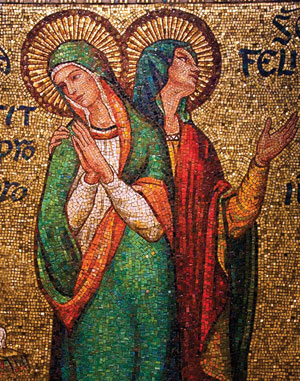
Today we continue our regular series called “Learning from the Saints.” Our guide is expert Bert Ghezzi, a dear friend of mine and the author of numerous books including Voices of the Saints, Saints at Heart, and Discover Christ: Developing a Personal Relationship with Jesus.
His more recent books are The Power of Daily Mass and The Heart of Catholicism. You can learn more about Bert and his work at BertGhezzi.com.
Today, Bert profiles St. Perpetua.
St. Perpetua was a delightful young woman we would like to have known personally. Clear-headed, courageous and charming, she took control of every situation. Perpetua dazzled people with her pluck, and they would just let her have her way. And most remarkably, she was merry in the face of certain death.
 When Perpetua became a Christian she was only 22 years old and the mother of an infant son. Shortly after her conversion in 203, the Emperor Severus decreed a persecution in Rome. Perpetua, her friend Felicity and three others were arrested and held for trial. Her father, a good pagan, tried to persuade her to renounce her new faith. While Perpetua felt her dad’s suffering, she could not reject Christ.
When Perpetua became a Christian she was only 22 years old and the mother of an infant son. Shortly after her conversion in 203, the Emperor Severus decreed a persecution in Rome. Perpetua, her friend Felicity and three others were arrested and held for trial. Her father, a good pagan, tried to persuade her to renounce her new faith. While Perpetua felt her dad’s suffering, she could not reject Christ.
“Father,” she said, pointing to a water jug, “do you see this container? Can you call it by any other name than what it is—a jug?
“No,” he replied.
“And in the same way, I cannot call myself by any other name than what I am—a Christian.” Quivering with anger, he left in defeat.
You can imagine how Perpetua missed her baby and how she feared for his future. But her mother and brother, both Christians, brought him to her in prison, relieving her anguish. “I spoke anxiously to my mother about my son,” said Perpetua, “and encouraged my brother. I commended my son to their care.”
Perpetua and her companions were tried before an angry mob. All refused to worship the emperor as a god and so were condemned to death by fighting wild beasts. Then at the emperor’s birthday celebration, she and her companions were paraded into the arena, the crowd roaring for blood. An eyewitness gave this account:
“For Perpetua and Felicity, the devil had reserved a vicious cow. Perpetua was first thrown and landed on her side. When she sat up she noticed her dress had been torn, and she adjusted it to cover her thigh. Modesty was more on her mind than pain. And then she pinned up her disheveled hair because she didn’t think it was right for a martyr to appear to be grieving at the moment of glory. She stood up, and when she saw Felicity struck down, she went over and helped her up.”
At this point Perpetua and Felicity were moved from the field to an arena gate. The saint appeared to be dazed in an ecstasy, not even realizing that she had been gored.
“She did not believe she had been attacked until she saw the marks of mauling on her body and on her dress. Then she exhorted her brother and a catechumen, saying: ‘Stand fast in the faith, and love one another, and don’t take offense at our suffering.’”
Soldiers were ordered to finish the women off by slitting their throats. Perpetua shrieked as a nervous soldier, a novice, awkwardly struck her with his sword. Then this extraordinary young woman took charge of her own martyrdom.
“And when the soldier’s hand still wavered, she guided the sword to her own neck. Perhaps so great a woman,” wrote the eyewitness, “could not be dispatched unless she herself were willing.”
The witness gave spiritual motives for Perpetua’s demeanor in the arena. Modesty and glory, he said, caused her to cover her thigh and fix her hair after she was gored. Perhaps so, but I would rather attribute her behavior to the natural impulses of a twenty-two year old woman. Perpetua was classy, and I think she just wanted to look good in her final hour.
(Image Credit: Our Sunday Visitor)
Read more from Bert at his website www.BertGhezzi.com, or check out his many books on Amazon.
